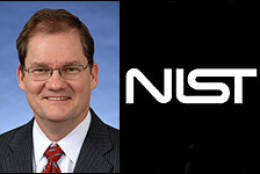Cybersecurity
-
OPM's Angela Bailey discusses how agencies are struggling to fill critical skill gaps in the hard sciences. Procurement attorney Joe Petrillo fills us in on what to expect with the new defense authorization law. Jacque Simon of AFGE says her union is frustrated with the lack of attention being paid to federal workers' concerns over sequestration. John Palguta of the Partnership for Public Service discusses possible changes agencies may face in President Obama's second term.
January 22, 2013 -
The Commerce Department issued a request-for-information asking for input from vendors around 11 cyber capabilities.
January 21, 2013 -
Prof. Martha Joynt Kuman compares today's ceremony with previous inaugurations. Paul Lawrence of Ernst and Young discusses how the president's cabinet may change in Obama's second term. Staff writer Kevin Baron of Foreign Policy Magazine discusses the limitations of the inspector general. Senior Airman Daniel Burkhardt talks about an app he helped to develop to help people navigate today's inauguration. Col. Gina Humble talks about the role the military will play in today's ceremonies.
January 21, 2013 -
The department is creating and trying out a universal curriculum for five foundational cyber roles in 2013. DISA is leading the effort and will add new roles next year as it refines the training. The agency says it is doing all it can to synchronize its training not just across DoD, but across the entire federal government in line with the National Initiative for Cybersecurity Education (NICE).
January 21, 2013 -
The White House's new national strategy for information sharing highlights the concept of collaboration in cybersecurity efforts. Michael Daniel, the White House cybersecurity coordinator, told the Federal Drive information security and information sharing are "mutually reinforcing."
January 17, 2013 -
Mike Locatis, the DHS Assistant Secretary for the Office of Cybersecurity and Communications, is returning to Colorado after serving in the federal government for more than two years.
January 17, 2013 -
Michael Daniel, White house cybersecurity coordinator, talks about the new national strategy for information sharing and safeguarding. Brian Friel of Bloomberg Government examines what new regulations mean to the bottom line of some contractors. Charles Crum of the Postal Service's IG office discusses how USPS is embracing the Internet. Michael Nugent of the Defense Language and National Security Education Office talks about a new language program of feds going overseas.
January 17, 2013 -
Cindy Auten of the Telework Exchange talks about a new report on BYOD. Robert Khuzami explains why he is stepping down as the SEC's enforcement director. Peter Schroeder of The Hill newspapers discusses the looming debt-ceiling showdown.
January 16, 2013 -
Kal Stein, president and CEO of EarthShare, talks about his company's new role as the manager of the Combined Federal Campaign of the National Capitol Area. Attorney John Mahoney weighs in on a recent ruling by the EEOC. Gen. Charles Wald of Deloitte talks about the ever-changing aerospace markets. Anne-Marie Fennell of GAO discusses Alaska Native Corporations. Ed Moscatelli discusses how the Army has eliminated 8,000 vehicles.
January 15, 2013 -
Martin Libicki of Rand Corp talks about managing cyber attacks. Kevin Brancato of Bloomberg Government discusses the Canada's decision to pass on the F-35. John Templeton of BlackMoney.com talks about being an African American in IT. Belva Martin of GAO discusses the new network communications strategy.
January 14, 2013 -
Muzaffar Chishti of the Migration Policy Institutes talks about the $18 billion the government is spending on immigration. Liz Gasster of the Business Roundtable weighs in on the need for comprehensive cybersecurity legislation. Ed Zurndorfer, register employee benefit consultant, discusses changes to the tax code.
January 11, 2013 -
IT Lab Director Charles Romine said the organization collaborates with an ever-growing number of agencies on technology challenges. He said the Lab also is focusing on questions around cloud, cybersecurity, mobile computing and big data. January 10, 2013
January 10, 2013 -
Paul Strasser of Dynamics Research Corporation talks about a new deal his company has with FDA. Marilee Fitzgerald, director of the Department of Defense Education Activity, discusses promoting STEM fields. Tim Scannell of Technology Guide reports from the Consumer Electronics Show in Las Vegas.
January 10, 2013 -
Dr. Mark Maybury, the Air Force's chief scientist, joins On DoD to describe the areas the Air Force plans for cybersecurity development.
January 09, 2013 -
Theresa Kern, a member of Women Construction Owners and Executives, discusses a new provision in the 2013 Defense Authorization Bill that helps women-owned, small construction companies. Grant McLaughlin of Booz Allen Hamilton talks about a new social media guide for feds. Alex Bolton of The Hill newspaper previews the upcoming confirmation season. Matthew Zisman of Bloomberg Government talks about new contracts for NASA.
January 09, 2013




